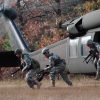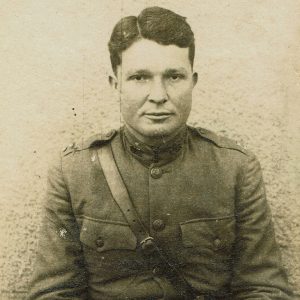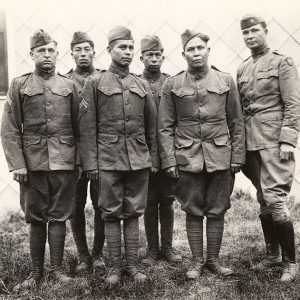calsfoundation@cals.org
Elijah Whitt Horner (1893–1984)
Elijah Whitt “Lige” Horner served in both World War I and World War II before retiring as a lieutenant colonel. He was instrumental in the first use of Native American languages as military code, selecting the men who eventually became known as the Choctaw Code Talkers in France during World War I.
Elijah Horner was born on May 19, 1893, near Mena (Polk County) to James Lafayette Horner, who was a farmer and real estate businessman, and Corah Elfleda Holman Horner. Horner was the youngest of the five children who lived to adulthood. His mother died when he was four years old, leaving him and his brother John to be raised by his older sisters—Mary Belle, Susan, and Oma.
After high school graduation in 1912, he worked at a grocery store, as a bank teller, and as a school teacher before joining the Arkansas National Guard in July 1914, serving with the Second Arkansas Regiment, Company I. His military record is incomplete, so his discharge date is unknown. On June 21, 1916, he enlisted in the Oklahoma National Guard First Infantry, Company H, and served during the Mexican Border War.
When the Oklahoma National Guard was federalized for World War I, it was combined with the Texas National Guard to form the Thirty-Sixth Division. Horner was a first lieutenant in the 142nd Infantry, Company E, when it sailed to France. In France, communications sent by Allied forces were intercepted and deciphered by the Germans.
In Oklahoma, Horner had worked closely with many of the Native American soldiers. When the decision was made to use Native American languages to transmit messages, Horner was asked to provide men for the task. He chose eight Choctaw men, who were placed two each at the regimental command post and the battalion command posts. The Choctaw “Telephone Squad” successfully ordered a complicated withdrawal of troops from two companies of the Second Battalion from Chufilly to Chardeny on October 26, 1918. Horner was awarded the French Croix de Guerre and was discharged on July 29, 1919, having obtained the rank of captain before the end of the war.
Horner married Maude Kathryn Board on September 4, 1919, and they honeymooned in Weiser, Idaho, where his sister Oma lived; they ended up staying forty-four years. They had one daughter, Ruby Kathryn, born in 1925. Horner became a successful businessman, co-owning the Horner-West Company, a real estate and insurance company, with partner Oakley West. He served on the school board and hospital board and as city treasurer. Additionally, he was a member of the American Legion, Kiwanis Club, and Weiser Masonic Lodge, among others. In 1935, he was appointed as the state representative for Weiser and served until his resignation in 1936 over a dispute with the state auditor.
On February 11, 1926, he joined the Idaho National Guard and served as captain in the 116th Cavalry and the 183rd Field Artillery. In 1941, he was promoted to major when his National Guard unit was federalized for use in World War II. He served as an administrative officer processing land claims in France through 1946. He was awarded the European African Middle Eastern Campaign Medal with two Bronze Stars. On December 24, 1945, he was promoted to lieutenant colonel and remained in the U.S. Army Reserves until his retirement on May 31, 1953.
In 1963, Horner and his wife moved to Fayetteville (Washington County) to be close to their daughter and her husband. He died of heart problems on January 19, 1984, in Fayetteville and is buried at Pinecrest Memorial Park in Mena.
For additional information:
“Arkansan Led Company of Indian Braves in France.” Arkansas Gazette, June 1, 1919, p. 10.
“Capt. Horner Put Indian Sign on Germans in War.” Weiser Signal, June 12, 1941.
“Eastern Papers Tell of Local Man’s Experience in World War.” Weiser Signal, March 3, 1938.
Erin Fehr
Sequoyah National Research Center
 Military
Military Elijah Whitt Horner
Elijah Whitt Horner  Horner and Choctaw Telephone Squad
Horner and Choctaw Telephone Squad 



Comments
No comments on this entry yet.